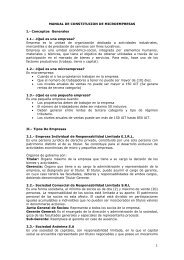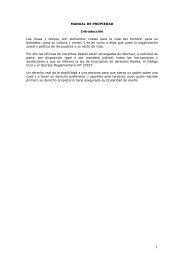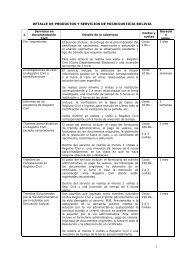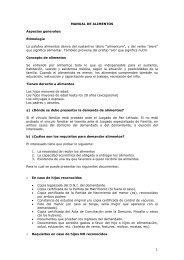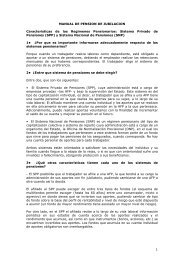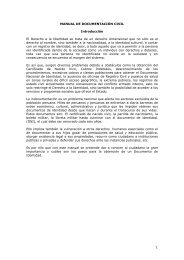ICISS report - International Coalition for the Responsibility to Protect
ICISS report - International Coalition for the Responsibility to Protect
ICISS report - International Coalition for the Responsibility to Protect
You also want an ePaper? Increase the reach of your titles
YUMPU automatically turns print PDFs into web optimized ePapers that Google loves.
The <strong>Responsibility</strong> <strong>to</strong> <strong>Protect</strong> 14<br />
HUMAN RIGHTS, HUMAN SECURITY AND EMERGING PRACTICE<br />
Human Rights<br />
2.16 The adoption of new standards of conduct <strong>for</strong> states in <strong>the</strong> protection and advancement<br />
of international human rights has been one of <strong>the</strong> great achievements of <strong>the</strong> post-World<br />
War II era. Article 1.3 of its founding 1945 Charter committed <strong>the</strong> UN <strong>to</strong> “promoting and<br />
encouraging respect <strong>for</strong> human rights and <strong>for</strong> fundamental freedoms <strong>for</strong> all without distinction<br />
as <strong>to</strong> race, sex, language or religion.” The Universal Declaration of Human Rights (1948)<br />
embodies <strong>the</strong> moral code, political consensus and legal syn<strong>the</strong>sis of human rights. The<br />
simplicity of <strong>the</strong> Declaration’s language belies <strong>the</strong> passion of conviction underpinning it. Its<br />
elegance has been <strong>the</strong> font of inspiration down <strong>the</strong> decades; its provisions comprise<br />
<strong>the</strong> vocabulary of complaint. The two Covenants of 1966, on civil–political and social–<br />
economic–cultural rights, affirm and proclaim <strong>the</strong> human rights norm as a fundamental<br />
principle of international relations and add <strong>for</strong>ce and specificity <strong>to</strong> <strong>the</strong> Universal Declaration.<br />
2.17 Toge<strong>the</strong>r <strong>the</strong> Universal Declaration and <strong>the</strong> two Covenants mapped out <strong>the</strong> international<br />
human rights agenda, established <strong>the</strong> benchmark <strong>for</strong> state conduct, inspired provisions<br />
in many national laws and international conventions, and led <strong>to</strong> <strong>the</strong> creation of<br />
long-term national infrastructures <strong>for</strong> <strong>the</strong> protection and promotion of human rights. They<br />
are important miles<strong>to</strong>nes in <strong>the</strong> transition from a culture of violence <strong>to</strong> a more enlightened<br />
culture of peace.<br />
2.18 What has been gradually emerging is a parallel transition from a culture of sovereign<br />
impunity <strong>to</strong> a culture of national and international accountability. <strong>International</strong> organizations,<br />
civil society activists and NGOs use <strong>the</strong> international human rights norms and instruments<br />
as <strong>the</strong> concrete point of reference against which <strong>to</strong> judge state conduct. Between<br />
<strong>the</strong>m, <strong>the</strong> UN and NGOs have achieved many successes. National laws and international<br />
instruments have been improved, a number of political prisoners have been freed and some<br />
victims of abuse have been compensated. The most recent advances in international human<br />
rights have been in <strong>the</strong> fur<strong>the</strong>r development of international humanitarian law, <strong>for</strong> example<br />
in <strong>the</strong> Ottawa Convention on landmines which subordinated military calculations <strong>to</strong><br />
humanitarian concerns about a weapon that cannot distinguish a soldier from a child, and<br />
in <strong>the</strong> Rome Statute establishing <strong>the</strong> <strong>International</strong> Criminal Court.<br />
2.19 Just as <strong>the</strong> substance of human rights law is coming increasingly closer <strong>to</strong> realizing <strong>the</strong><br />
notion of universal justice – justice without borders – so <strong>to</strong>o is <strong>the</strong> process. Not only have<br />
new international criminal tribunals been specially created <strong>to</strong> deal with crimes against<br />
humanity committed in <strong>the</strong> Balkans, Rwanda and Sierra Leone; and not only is an<br />
<strong>International</strong> Criminal Court about <strong>to</strong> be established <strong>to</strong> try such crimes wherever and whenever<br />
committed in <strong>the</strong> future; but, as already noted in Chapter 1, <strong>the</strong> universal jurisdiction<br />
which now exists under a number of treaties, like <strong>the</strong> Geneva Conventions, and which<br />
enables any state party <strong>to</strong> try anyone accused of <strong>the</strong> crimes in question, is now beginning <strong>to</strong><br />
be seriously applied.<br />
2.20 The significance of <strong>the</strong>se developments in establishing new standards of behaviour,<br />
and new means of en<strong>for</strong>cing those standards, is unquestionable. But <strong>the</strong> key <strong>to</strong> <strong>the</strong> effective<br />
observance of human rights remains, as it always has been, national law and practice: <strong>the</strong><br />
frontline defence of <strong>the</strong> rule of law is best conducted by <strong>the</strong> judicial systems of sovereign<br />
states, which should be independent, professional and properly resourced. It is only when<br />
national systems of justice ei<strong>the</strong>r cannot or will not act <strong>to</strong> judge crimes against humanity<br />
that universal jurisdiction and o<strong>the</strong>r international options should come in<strong>to</strong> play.



